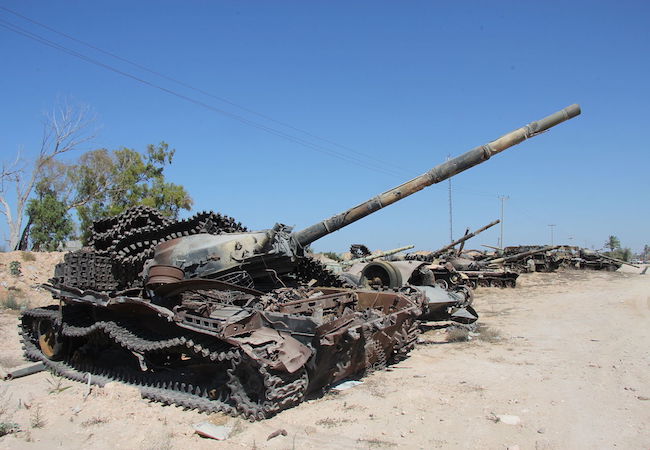Ten years since NATO overthrew Libya’s Gadhafi

It’s 10 years since NATO hammered defenceless Libya and French jets drove the mercurial President Muammer Gadhafi into a drainage tunnel where members of a mob killed him. President Barack Obama, who had preached again and again of his abhorrence for any more military interventions, reversed himself, arguing that this particular intervention was necessary for humanitarian reasons since Gadhafi’s forces were mercilessly supressing an uprising. Self-declared human rights activists in Obama’s entourage like Samantha Power, the US ambassador to the UN, and his national security advisor, Susan Rice, egged him on. Later, Obama confessed that this was the worst mistake of his presidency. It cost 30,000 lives, threw a once quiet country into a cataclysm of factional fighting, destroyed much of the country’s social and medical services, and brought the economy to its knees. Later, the CIA having captured Gadhafi’s stockpile of weapons, shipped them to Syria to arm jihadist groups fighting the government.
Gadhafi, a dictator who surrounded himself with female bodyguards, used his country’s immense oil wealth to make it the country in Africa number one in literacy, education and income. Literacy, for example, went from 25% to 88%. Although Libya is 90% desert his great engineering projects brought water to nearly all its inhabitants.
He also used his wealth to fund a good number of anti-government movements in different parts of the world- the IRA in northern Ireland, the Palestine Liberation Organisation and the Black Panther party in the US.
He threatened Western interests by promoting a merger with Egypt and Syria. He also wanted to create a pan-African currency, making use of Libya’s gold reserves of 144 tons. This would allow Libya and Africa to wean themselves off the US dollar and the French franc used in 14 African countries. At the time when Hillary Clinton was secretary of state her purloined e-mails revealed the discussions on what to do about Libya’s financial plans. The emails reported on French president Nicolas Sarkozy, saying that “Gadhafi’s idea of an alternative to the African franc was one of the factors that influenced his decision to commit France to the attack on Libya”. He didn’t want to see France’s sizeable influence over its former colonies circumscribed.
Ten years ago Gadhafi faced an uprising. It flagged itself as being committed to democracy and human rights. It was a bloody affair. The rebels actively sought help from the UN. After a long debate the Security Council passed a resolution in March 2011 that approved “by all means necessary” an intervention “to protect civilians”. Western nations voted for it. Russia and China abstained. But when NATO revealed with its bombing on March 19th that it was also bent on the destruction of Gadhafi, Russia felt betrayed. So did Germany, another abstainer. If Russia had known what was afoot it would have vetoed the resolution. Moscow never appreciates having the wool pulled over its eyes by Washington.
Immediately after the killing of Gadhafi, Mrs Clinton was reported as jumping with joy, saying, borrowing from Shakespeare, “We came, we saw, he died”.
All this happenednot long after Gadhafi reached out to the West in an attempt to reduce hostilities. He allowed the UK and the US to dismantle Libya’s efforts to move towards building a nuclear bomb. He sent for trial in Scotland two men suspected of blowing up an American airliner in Scottish skies. Diplomacy was beginning to work. The military intervention aborted this and, in its stead, created chaos.
Before long it became apparent there were two warring factions fighting for control of the government, one based in Tripoli, the capital and the other in Benghazi, the main port for exporting oil. (Libya has the largest oil reserves in Africa.) In the wings lurk Al-Qaeda, ISIS and other jihadist fighters.
Eight years after the NATO invasion the factions were still fighting. The UN all along has sought to mediate. Finally, in October last year a ceasefire was brokered. Elections are scheduled for December.
It’s a difficult road ahead for Libya. Even today in liberal circles within the US’s Democratic Party there is a debate about the pros and cons of humanitarian military intervention. Perhaps a majority still argue that in some cases it’s necessary, although they are hard put to give an example where it has succeeded in implanting democracy and liberty.
The withdrawal from Afghanistan has resuscitated this important debate. It’s quite clear from Biden’s record while vice-president that he personally has renounced his earlier belief that large-scale military intervention can do good. He was a lone voice in Obama’s cabinet in not wanting to extend the US’s military presence in Afghanistan. He opposed the attack on Libya.
Biden has the support of ex-presidential candidate, Bernard Sanders in the senate and Alexander Ocasio-Cortez in the House, who between them can summon up a significant number of American senators, congressmen and voters. (They are also stalwart supporters of Biden as he attempts to push through Congress bills that will aid the poor, build up the subsidised health services and renew America’s infrastructure.)
One can safely say that on Biden’s watch there will not be another Iraq, Afghanistan or Libya. My worry is the mindset of who may come after, in three years’ time or seven. Don’t count on American liberals, much less its conservatives, to do the sensible thing- although, ironically, Donald Trump was a “non-intervener”.




